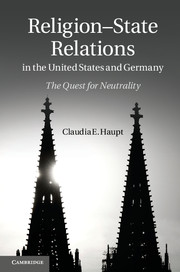Introduction
Published online by Cambridge University Press: 05 January 2012
Summary
Those who would renegotiate the boundaries between church and state must … answer a difficult question: Why would we trade a system that has served us so well for one that has served others so poorly?
McCreary County v. ACLU, 545 US 844, 882 (2005) (O’Connor, J., concurring)The year 2005 marked a milestone in the history of the US Supreme Court. With the death of Chief Justice William H. Rehnquist, an era in Court chronology that had lasted since 1986 – the Rehnquist Court – ended, and with the appointment of Chief Justice John G. Roberts, Jr., a new one began. Another momentous change occurred that same year. In the summer of 2005, Justice Sandra Day O’Connor, the first ever woman to serve on the Court, announced her retirement from the bench. Though Chief Justice Roberts had initially been nominated for Justice O’Connor’s seat, the unexpected passing of Chief Justice Rehnquist led to a change in plans. Instead, Justice Samuel A. Alito succeeded Justice O’Connor.
Justice O’Connor had long been considered a particularly important voice on the Court in the area of religion clause jurisprudence, and in 2005, just prior to her retirement, two landmark decisions involving displays of the Ten Commandments on public property were handed down. Indicative of the disagreement on Establishment Clause issues, the two cases spawned a total of ten opinions from the nine justices, resulting in what one observer called “a dizzying array of widely divergent interpretations of the Establishment Clause.” In one of those two cases, Justice O’Connor made the above-quoted connection between religion–state relations and comparative constitutional law.
- Type
- Chapter
- Information
- Religion-State Relations in the United States and GermanyThe Quest for Neutrality, pp. 1 - 8Publisher: Cambridge University PressPrint publication year: 2011



